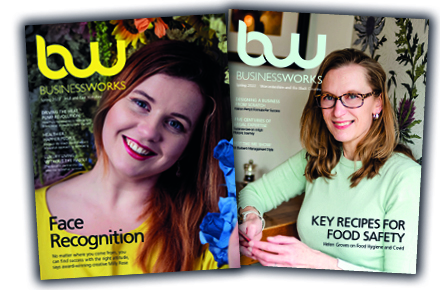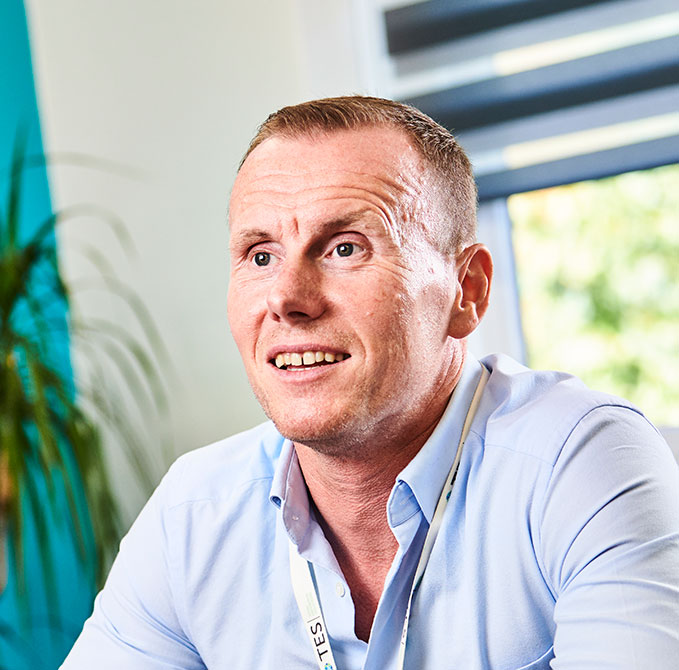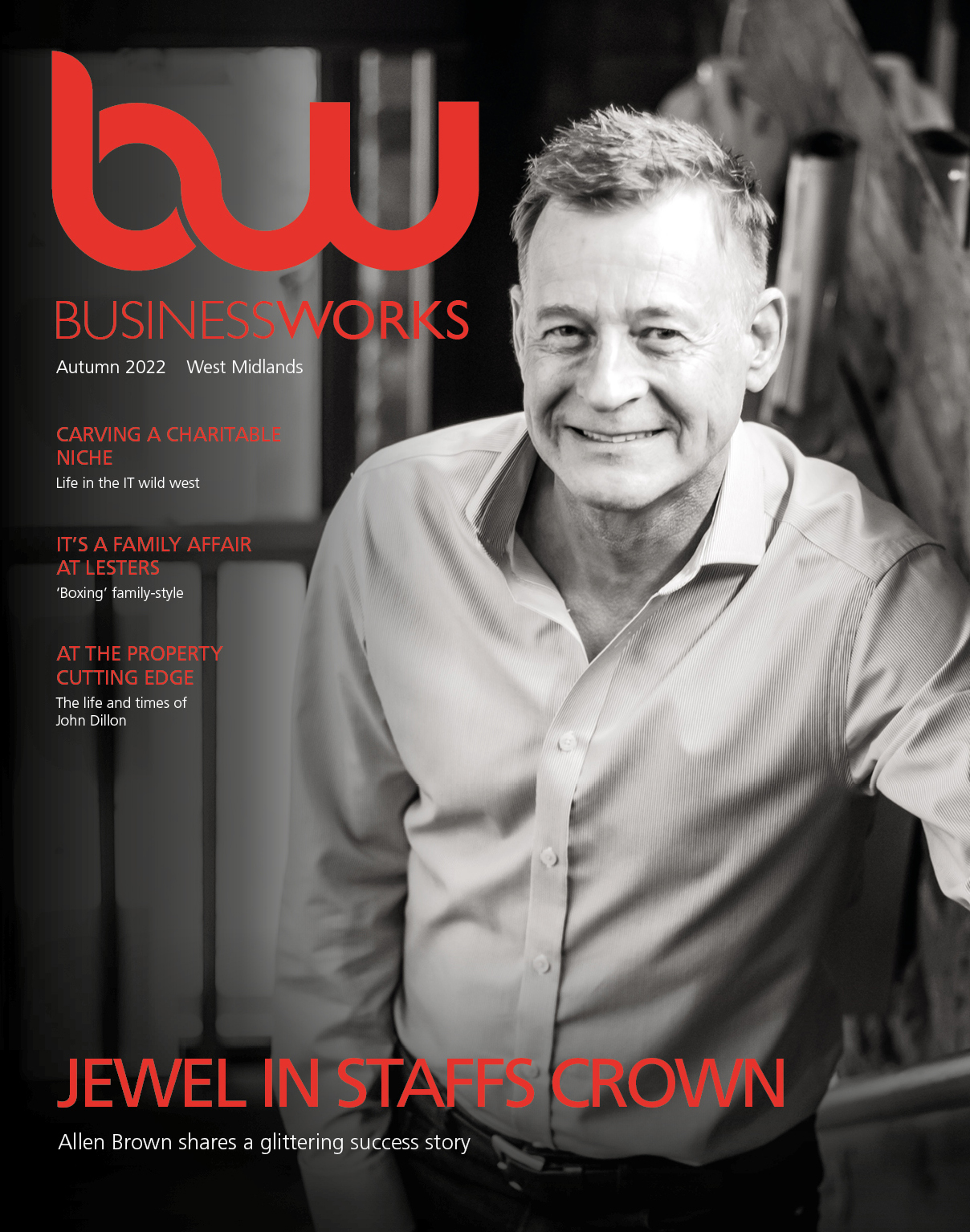After around 30 years in the highly specialised world of IT, Paul Faulkner can speak with considerable authority on the subject – and he is eager to share his views on his chosen profession.
Sitting in the modern hi-tech offices of Total Enterprise Solutions (TES). on the fringes of the former Cannock Chase coalfield, Paul says: “One of the biggest problems is that it is the Wild West.
“In IT, you hear horror stories of failed projects, of projects that don’t achieve their delivery, the horror stories of people saying it is going to be a certain amount of money and then they get into the project, and it ends up costing double.
“Always, always, always, what we agree with the client in terms of the price is what they pay. That is something we pride ourselves on.”
That pride in the products and achievements of TES over the past decade and a half is evident as Paul outlines the history of the company which has grown to become one of the UK’s leading business management software specialists, supporting a wealth of UK charities and Not For Profit organisations as they embrace the digital age.
You could reasonably argue that the successful growth of TES into a UK IT market leader for charities seeking to survive and prosper in the digital era is an intriguing metaphor for the UK and West Midlands economy itself and its transformation from a former manufacturing hotbed into the hi-tech juggernaut of today.
After all, a mere stone’s throw from TES’s well-appointed offices on a Rugeley industrial park sits the former site of Lea Hall Colliery, which had provided livelihoods for thousands of miners over the course of around 30 years until it fell victim to the Thatcherite industrial revolution which changed the face of the UK in a new post-industrial world.
That economic change would see coal mines such as Lea Hall and other heavy industries swept aside as the UK entered a new hi-tech era driven by the technological revolution which has been further galvanised by the unstoppable march of the Internet.
And that inevitable switch to a hi-tech economy has spawned 21st century enterprises such as TES, which in the last five years alone has seen turnover mushroom from £1 million to £6 million. The financial facts speak for themselves, as Paul points out.
“Last year we added 18 new clients and this year we have set a target of 30 new customers and we are on track to meet that. This will be our greatest ever year of client acquisition. April, May, June was our largest ever sales quarter in the company’s history.”
But that only tells part of the TES story. In Paul’s words: “It is easy to say we are just going to grow at any cost at the expense of the staff, the pressure, staff engagement and the service quality to your customers and we have seen competitors doing that.
“The real challenge is saying ‘have a great environment for your staff, deliver a great service to your customers and grow at a healthy rate.’ We now have the largest market share of charities in the UK – but it is not just growth but also investment. While we have grown, we have also got better.”
TES has clearly grown at that desired rate ever since a trio of IT entrepreneurs founded the business around 17 years ago, as Paul recalls today.
“The company was founded by three guys who are still directors of the company today, Chris Wilson, Robin Parkin and Shane Clarke. Robin had been at KPMG and ended up at the High Street chain Gamestation and then found his way into IT and got excited about what digital transformation could bring to organisations.
“Chris and Shane knew each other and came from the technical end, consulting, training, developing. They formed TES and through word of mouth they gathered a handful of customers, including the National Gallery, the Victoria and Albert Museum, Chester Zoo. Most of the initial growth was very much word of mouth, referrals.
“Over 11, 12 years they grew to a £1 million turnover with 13, 14 people, 20 to 25 clients and that was the story until about five years ago. I had worked with Chris two decades ago on a project for the UK Government down in Westminster, the Sure Start scheme, one of Tony Blair’s initiatives, to improve the lives of children from birth to four.”
By then Paul had already clocked up years of experience in the world of IT following an apprenticeship at the Midland Red bus company, where he quickly realised he had found his true vocation in life.
“I went to Midland Red when I was just 16 – I am 46 now. I loved it. When I was seven or eight my dad bought me a computer and I was fascinated. It really went from there. It has always been IT, computers, that has been my background through and through working from the tools, from consultancy to software development. I was fortunate that I found something that I liked that was also something that I could make a career out of.”
Paul quickly rose through the ranks in the now burgeoning world of IT, in a variety of roles at Open Systems Ltd in Kitts Green, Birmingham and Professional Computer Solutions in Curdworth before its acquisition by Acora, where he successfully merged its software division with the PCS business.
“They exceeded all their growth expectations and the whole business became £17 million, £18 million. After two years, they invited me to join the board, with the spare seat being COO (Chief Operating Officer), so I took that up. Over the next three years we created a 24-7 managed service with 170 people, 130 reporting to me as COO.
“Acora was a fantastic five years for me, three years in a boardroom. What was important to me is that I suppose I am more of a CEO than a COO. I wanted to have overarching responsibility for strategy, the commercial side of the business. Culture and values have always been really important to me.
“My paths crossed again with Chris Wilson and the guys were sat there saying ‘look, we have done some nice things over the last 11 to 12 years but what does the next 10 years look like?’ I said, ‘I will come in, look at what you are doing and will give you some advice.’ I came in and lifted the bonnet.
“On the business side, the three shareholders, Chris, Robin and Shane, were aligned. What stood out was their values, they really cared about their people, albeit it was a small team, about their customers, and that resonated with my values. Taking care of people and delivering to clients should be second nature.
“Unfortunately, there are a lot of organisations that put values up on posters, they talk about taking care of people, they talk about delivering to their customers but what then happens day to day is that decisions are made purely on a pound note basis. I think things are quickly sacrificed when it comes to cash.
“I saw TES as a platform to be able to implement everything I had learnt in the preceding 25 years and really put that best practice of bigger company systems, processes and values into place and see what could be achieved by adopting that best practice but also relentlessly focusing on living by your values and taking care of people, even if it costs you money.”
Paul may have switched from a significantly larger turnover operation at Acora to a smaller unit at TES – but he had also found his own niche in a business which itself was set to focus on a niche market with highly impressive results, utilising the power and capabilities of the Microsoft Dynamics 365 system.
“In the software business it is either get big by volume or get big by focusing on a particular market. What stood out is that they had a cluster in the customer base of charities and Not For Profit organisations. I said I think there is an opportunity in the UK to become the market leaders in the UK in delivering software solutions to charities and Not For Profit. We focused all of our product development strategy on this sector.
“It was a wise decision and our organic growth year-on-year average for the last five years has been 30 to 33 per cent.”
That decision to concentrate on a niche sector and help steer the charities into a new hi-tech world has paid handsome dividends for TES as Paul reels off a string of charities on the Rugeley firm’s books of around 90 clients, including Age UK, the King’s Fund, Royal Marine charities, the Elton John AIDS Foundation, Cycling UK, Diabetes UK, the Bible Society and many others.
“We are now working with 70 charities all over the UK, everything from health to animal welfare to children’s hospices and the care sector.
“Like a lot of organisations, charities’ funding is under pressure, they are looking at how to save costs and how to become more efficient in the way they run their own operations. Part of what we do is save them costs because the systems we implement save time. The key phrase is digital transformation. It takes the form of enhancing the tools that employees of the business have to use, saving them time, making their jobs easier, giving them quicker information to make decisions.
“If you fast forward the last five years, we have gone from £1 million turnover to this year, when we will deliver just over £6 million revenue. That has come through a clear strategy, because there wasn’t one (before). We laid out the vision, the values and the strategy.
“We are on a 10-year plan we laid out five years ago and we are two years ahead of that in terms of growth.”
That expansion has seen TES support ‘significant social impact,’ according to Paul. “IT can be a fairly dispassionate, cold game. The people who come to work for us know that the work they are doing is driving significant support those charities need to drive social impact.”
Meanwhile, TES, which has grown to a 60-strong workforce, is also putting its money where its mouth is, last year donating five per cent of profits back to charity, representing a £30,000 windfall.
“Our goal is continued growth. We have a clear path over the next three years that we would be £10 million plus as a business and about 100 staff. That is without considering the acquisition factor – we are always looking to consider the right acquisition.”




